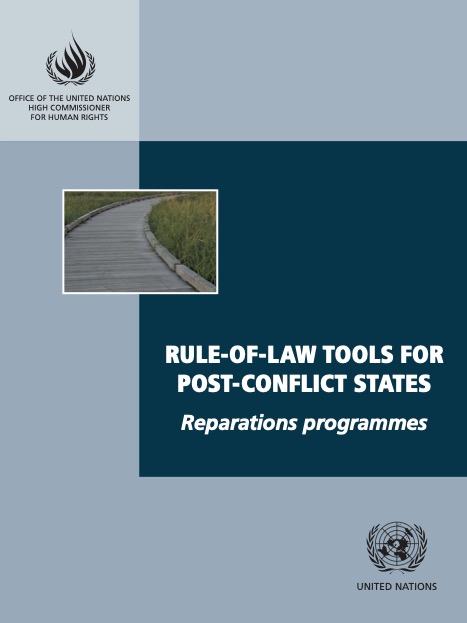
OHCHR Rule of Law Tools for Post-Conflict States: Reparations Programmes
The Office of the United Nations High Commissioner for Human Rights (OHCHR) has long been committed to promoting work on reparations for victims of human rights violations. Some of these efforts have borne fruit in recent years with the adoption by the General Assembly of the Basic Principles and Guidelines on the Right to a Remedy and Reparation for Victims of Gross Violations of International Human Rights Law and Serious Violations of International Humani- tarian Law.1 Similarly, OHCHR stood behind the work that led to the Updated Set of principles for the protection and promotion of human rights through action to combat impunity2 and the accompanying reports,3 which also contain important references to reparations.
This publication is intended to assist in the implementation of the principles contained in the above-mentioned documents. It is a practical tool to provide guidance on implementing repa- rations initiatives. Its focus is not on redressing single or isolated human rights violations, but on how to establish (out-of-court) reparations programmes to help redress cases of gross and serious violations of human rights in the wake of conflict or authoritarian rule. In such situations large numbers of victims deserve and call for reparations, but their claims cannot be redressed through individual cases in a court of law, in part because of their numbers and in part because of the incapacity of the legal system.
Date
Document Versions (PDF Download)
English
(0.76MB)
The Office of the United Nations High Commissioner for Human Rights (OHCHR) has long been committed to promoting work on reparations for victims of human rights violations. Some of these efforts have borne fruit in recent years with the adoption by the General Assembly of the Basic Principles and Guidelines on the Right to a Remedy and Reparation for Victims of Gross Violations of International Human Rights Law and Serious Violations of International Humani- tarian Law.1 Similarly, OHCHR stood behind the work that led to the Updated Set of principles for the protection and promotion of human rights through action to combat impunity2 and the accompanying reports,3 which also contain important references to reparations.
This publication is intended to assist in the implementation of the principles contained in the above-mentioned documents. It is a practical tool to provide guidance on implementing repa- rations initiatives. Its focus is not on redressing single or isolated human rights violations, but on how to establish (out-of-court) reparations programmes to help redress cases of gross and serious violations of human rights in the wake of conflict or authoritarian rule. In such situations large numbers of victims deserve and call for reparations, but their claims cannot be redressed through individual cases in a court of law, in part because of their numbers and in part because of the incapacity of the legal system.
